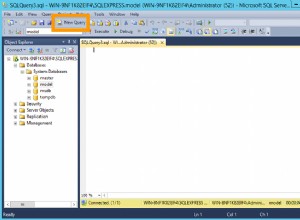Un avvertimento:non sono un normale programmatore C#.
Ma comunque questo codice fa quanto segue:
Apre un file chiamato C:\Input.TXT
Cerca in ogni riga. Se la riga ha più di 5 virgole, prende tutte le virgole extra dal terzultimo campo (note)
Scrive il risultato in C:\Output.TXT - è quello che devi effettivamente importare
Ci sono molti miglioramenti che potrebbero essere apportati:
- Ottieni i percorsi dei file dai gestori delle connessioni
- Gestione degli errori
- Un programmatore C# esperto potrebbe probabilmente farlo in hlaf il codice
Tieni presente che il tuo pacchetto avrà bisogno dell'accesso in scrittura alla cartella appropriata
public void Main()
{
// Search the file and remove extra commas from the third last field
// Extended from code at
// https://stackoverflow.com/questions/1915632/open-a-file-and-replace-strings-in-c-sharp
// Nick McDermaid
string sInputLine;
string sOutputLine;
string sDelimiter = ",";
String[] sData;
int iIndex;
// open the file for read
using (System.IO.FileStream inputStream = File.OpenRead("C:\\Input.txt"))
{
using (StreamReader inputReader = new StreamReader(inputStream))
{
// open the output file
using (StreamWriter outputWriter = File.AppendText("C:\\Output.txt"))
{
// Read each line
while (null != (sInputLine = inputReader.ReadLine()))
{
// Grab each field out
sData = sInputLine.Split(sDelimiter[0]);
if (sData.Length <= 6)
{
// 6 or less fields - just echo it out
sOutputLine = sInputLine;
}
else
{
// line has more than 6 pieces
// We assume all of the extra commas are in the notes field
// Put the first three fields together
sOutputLine =
sData[0] + sDelimiter +
sData[1] + sDelimiter +
sData[2] + sDelimiter;
// Put the middle notes fields together, excluding the delimiter
for (iIndex=3; iIndex <= sData.Length - 3; iIndex++)
{
sOutputLine = sOutputLine + sData[iIndex] + " ";
}
// Tack on the last two fields
sOutputLine = sOutputLine +
sDelimiter + sData[sData.Length - 2] +
sDelimiter + sData[sData.Length - 1];
}
// We've evaulted the correct line now write it out
outputWriter.WriteLine(sOutputLine);
}
}
}
}
Dts.TaskResult = (int)Microsoft.SqlServer.Dts.Runtime.DTSExecResult.Success;
}




